Breaking News: At least 10 feared to have drowned in Makueni river
Why football polls in Africa are more than just about the game
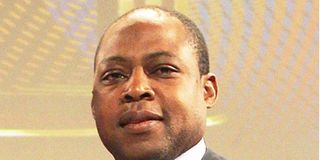
Zambian football legend Kalusha Bwalya.
What you need to know:
- Currently in Africa there are several football associations embroiled in election quagmires.
- These battles for leadership are long-drawn with some running into a full year as a result of unresolved issues.
Football played a big role during the independence struggle in Africa and continues to attract political interest that sometimes overshadows the action on the pitch.
There are many clubs on the continent that were fully engaged in the liberation struggle especially in sub-Saharan Africa. These clubs were used to galvanise populations into uprisings and some have remained part and parcel of political parties.
The sport has also produced several heads of state in Africa starting with Algeria’s Ahmed Ben Bela, who played football in France 1939-40, before returning to his native country for the liberation struggle eventually becoming the president.
George Weah used the power of football to become the president of Liberia. Mobutu Sese Seko rode on the wave of football popularity to cling on to power in Democratic Republic of Congo.

Liberia president George Weah.
Even in the war-torn Central Africa Republic (CAR), football holds sway in national politics. During the civil war in that country, football and politics mixed in the battle to influence people.
One of the war lords in the war Patrice Edouard Ngaissouna was even elected the president of the country’s FA and later pushed by the Head of State General Bozize to occupy a position in the Caf Executive before Fifa abandoned him as he was hauled to the Hague to face war crime charges.
Currently in Africa there are several football associations embroiled in election quagmires.
These battles for leadership are long-drawn with some running into a full year as a result of unresolved issues.
These squabbles are not purely football matters – there is national politics, Caf/Fifa interests and tribalism in the whole mix
Something is not right in Cote d’Ivoire, Kenya, Zambia, Liberia, Sierra Leone and Guinea Bissau. In all these countries, there is a stalemate. Football elections have put the countries’ political leadership, Caf and Fifa on the spot.
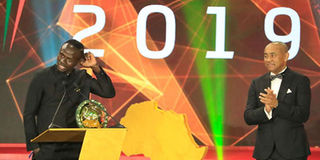
Senegal winger Sadio Mane (left) receives the award for Player of the Year from Ahmad Ahmad, President of the Confederation of African Football, during the 2019 Caf Awards in the Egyptian resort town of Hurghada on January 7, 2020.
In some of the football feuds the countries’ political leadership have had a hand in the confusion and in some, Caf and Fifa have been accused of applying double standards – all related to politics in the two football organisations.
The upcoming Caf elections and the uncertainty at Fifa are some of the factors that are fuelling endless squabbles in most of these federations.
For instance, there is a strong indication that there will be candidates for the 2021 Caf elections where the incumbent Ahmad Ahmad of Madagascar is under threat of losing his seat.
That makes the situation more complicated because some of the candidates have strong connections within Caf and Fifa and would definitely lean on the side of their preferred candidates.

South African President Jacob Zuma (right) shows the paper Cap Verde to Confederation of African Football (CAF) Issa Hayatou during the final draw of the Africa Cup of Nations 2013 (CAN) in Durban on October 24, 2012.
Besides, there is also a feeling that the remnants of former Caf President Issa Hayatou, who was ousted in 2015, are re-grouping intent on playing a role in the Caf elections next year.
Most of these remnants, who stood with Hayatou until the last minute, have been shut out from Caf committees. They are many and they have not moved on, making the situation fluid especially within Caf.
In Cote d’Ivoire, former Chelsea and national team striker Didier Drogba, 42, is engulfed in a big battle with two other contenders for the control of the country’s football association leadership.
Elections have been called off twice and Drogba has been de-listed from the contest over some legibility shortcomings.
Reports in Abidjan reveal that the country’s leadership is uncomfortable with Drogba’s presidency. Drogba, Cote d’Ivoire’s all-time top scorer, hails from the Bete tribe from the south west –same as former President Laurent Bbagbo.
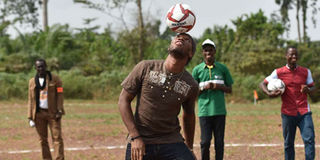
Ivory Coast's football star Didier Drogba plays with a ball on the football ground of the Primary School Didier Drogba during its inauguration on January 18, 2018 in Pokou-Kouamekro, near Gagnoa, central-western Ivory Coast.
Feeling that he was being targeted for disqualification in favour of the current football president Idris Diallo, the former Chelsea striker wrote to Fifa, who have since asked the Ivorian Government to suspend the election and allow for a new electoral board to be put in place.
During the Cote d’Ivoire civil war, Drogba was at the forefront to calm the situation despite rebels, who ousted Bbagbo, burning down his palatial home in his home village.
The Cote d’Ivoire stalemate is equally complex as some stakeholders like former professional players, referees and coaches are deeply divided.
It is believed the government has a hand in it. Cote d’Ivoire goes to the national polls in October and national politics influencing football matters cannot be ruled out.
In Kenya, the usual confusion has resurfaced. Since independence, the Kenya FA has never had a proper transition. Kenya is one of the leading countries in Africa where normalisation committees have run football before an impasse is resolved.
Tribalism also surfaces whenever there is a football election. The current situation in Nairobi is messy and the probability of a normalisation committee cannot be ruled out.
There are three major protagonists fighting to head Football Kenya Federation.
The incumbent Nick Mwendwa, whose mandate expired last February, long serving Cecafa Secretary General Nicholas Musonye and former FA president Sam Nyamweya are headed for a tough contest that has already taken a legal angle. There are other contenders as well including greenhorns Herbert Mwachiro and Boniface Osano.
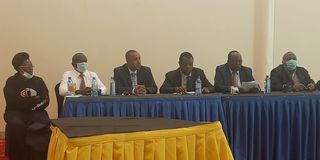
From left to right,: Angeline Mwikali, Andrew Amukoa, Twaha Mbarak, Nicholas Musonye, Sam Nyamweya and Simon Mugo duiring the press briefing at a Nairobi hotel on September 1, 2020.
The equation in Kenya is really complex. Half of the contenders have claimed the incumbent is using unlawful means with the electoral board he appointed to rig the election.
They have threatened to form a parallel football federation as it happened a few years ago if the Government does not intervene.
The Sports Ministry has surprisingly remained silent despite the fact that the elections have been cancelled twice by the Sports Dispute Tribunal in Nairobi.
Some sources in Cairo reveal that the Caf elections due in March next year are having an influence in the Kenyan polls.
The Caf executive is divided between Mwendwa and Musonye, while Nyamweya is looking to pass in between.
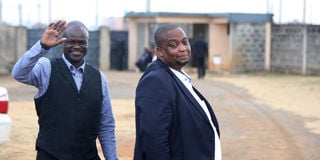
FKF presidential aspirant Herbert Mwachiro (right) and his running mate Harold Ndege arrive to present their nomination papers at Kandanda House, Nairobi on August 31, 2020.
Fifa on the other hand have left the matter to be sorted out by head of their National Associations Mosengo Omba, who appears to be interested in maintaining the status quo in Nairobi.
Mwendwa’s challengers have accused Fifa and more specifically Mosengo of taking sides in the dispute and shifting goal posts.
The road-map for the polls has been released but there are many pending cases at the Tribunal which may put the whole exercise in jeopardy.
Meanwhile, Mwendwa continues to run a federation without a National Executive Committee and Governing Council as if things are normal, which is far from the case.
He has labelled his opponents “old” who spend time ‘‘drinking wine”, while he is busy developing football in the country.
In Lusaka, former Football Association of Zambia President, legend Kalusha Bwalya is crying foul. The 1988 African Footballer of the Year was elected Zambia FA President and served two terms until he was ousted by businessman Andrew Kamanga in 2016.
His bid to make a comeback has hit a rock as the Zambian football electoral board has failed to clear him claiming he does not reside in Zambia.

Zambian football legend Kalusha Bwalya.
Like in Kenya and Cote d’ Ivoire, Kalusha feels the electoral board is biased and is working with some political figures to frustrate his come-back bid.
Like in several African countries, politics and football in Zambia are intertwined. Kalusha enjoyed good relations with the former Zambia President the late Paul Sata. The elections in Zambia were due in February this year, but are yet to be held as aspirants bicker over the rules.
Kalusha has on several occasions complained that the electoral board has put obstacles in his path arguing that he served for eight years before and the legibility criteria was never raised. Kalusha also served as Caf Executive Committee member before he was ousted a few years ago.
Besides the electoral board, Kalusha, one of the greatest players from the continent, also accuses Mosengo of siding with the incumbent.
The stalemate in Guinea Bissau is interesting. The incumbent president Manuel Nascimento Lopez, a close ally of Hayatou, was headed for a third term early August when Fifa Ethics Committee stopped the elections 12 hours before they were due to start.
The ethics committee charged Nascimento of participating in an incident of mob justice that left a man seriously wounded on the streets of Bissau.
The committee banned Nascimento for 10 years and fined him $108,000 for what they considered “having breached his duty to protect the physical and mental integrity of others”.
Nascimento, a wealthy businessman in Bissau, has read politics in the whole saga as he sees the hand of Caf in his tribulations.
Like Kalusha, Nascimento has taken the matter to the Court of Arbitration (CAS).
The Guinea Bissau polls remain suspended and Fifa has ordered a new electoral board put in place, but still ensure that Nascimento is not a candidate.
Which national federation polls in Africa will be next?




